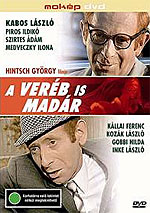 Sparrows Are Birds Too
Sparrows Are Birds Too
A veréb is madár
Hungary, 1968, colour, 79 mins
If I had to recommend one 1960s Hungarian comedy, it would almost certainly be Péter Bacsó’s brilliant The Witness (A tanú, 1969), one of only two films that were singled out by Tibor Fischer’s notoriously splenetic rant (in The Guardian, 7 October 2006) as exceptions to the general rule that Hungarian films were immensely tedious. Its scintillating anti-Stalinist satire cut so close to the bone that it was banned until the early 1980s, but has since become an indelible part of Hungarian popular culture.
But those who’ve enjoyed Bacsó’s film and fancy something in a similar vein could do a lot worse than sample György Hintsch’s Sparrows Are Birds Too, made the previous year. Although much of it is gently amusing rather than side-splittingly hilarious (at least to someone entirely dependent on the subtitles), it shares a similar cheekiness in its constant mockery of certain aspects of Hungarian life, especially vis-à-vis its capitalist counterparts. Right from the start, fun is poked at the difficulties encountered by Hungarians in leaving their country (Sándor Holló cunningly joins an Austria-versus-Hungary cycle race just before a legitimate border crossing, and from there emigrates to California), and it goes on to derive humour from the absurdities of socialist bureaucracy, the desire for hard currency over the soft local variety, and the special treatment meted out to foreign VIPs at the expense of the locals (an entire conference of academics has to share a hotel room in order to free up two luxury suites for what the hotel considers to be a better class of guest).
In the most telling scene, a striptease is constantly interrupted by a burly maître d’, announcing that certain groups of people are not entitled to see any more – first, the Hungarians (naturally), then the Czechs, Russians and East Germans, until only the Americans are left. Even more tellingly, the guests are defined by their currency rather than their nationality – indeed, this set-piece is known as the Hard Currency Striptease.
The plot is a series of variations on that age-old theme of mistaken identity based around Sándor having an identical twin brother, Zoltán (both played by László Kabos, a kind of ginger Hungarian Woody Allen). The latter is a humble factory worker and part-time inventor, who fails to attract much interest in his revolutionary cleaning device, to the consternation of his implausibly attractive girlfriend Szöszi (Ildikó Piros), whose name translates literally as ‘Blondie’. When Sándor returns to his native country for the first time in fifteen years as a successful businessman, he naturally reunites himself with Zoltán – who opportunistically steals his coveted US passport and whisks Blondie off for a lavish weekend at his brother’s expense. (She is under the impression that he is Sándor, having decided that the latter is far more dynamic and exciting).
Most of this is extremely silly, and any doubts that this is essentially a slapstick farce are eliminated when someone crashes through a hotel room door, leaving a neatly cut-out hole matching his shape. But Kabos copes well with his dual role (and a surprising amount of split-screen trickery to make both brothers appear on screen at once), even though it’s not always obvious which brother is which at any given moment. Other nifty set-pieces include a tour of a hotel where assorted flunkeys are frantically rolling up the red carpet behind the distinguished visitors, rushing up the back stairs and unrolling it on the upper floor just in time, or anti-capitalist billboards being replaced by far more US-friendly ones in a matter of seconds. There’s also a surprising amount of near-the-knuckle eroticism, including topless female nudity on more than one occasion and two scenes that come perilously close to going further, with only a feather boa protecting the actress’s modesty. No classic, then, but fun in parts.
- Director: György Hintsch
- Writers: Balázs Farkas, István Kállai
- Camera: István Hildebrand
- Editing: Sándor Zákonyi
- Design: Béla Zeichan
- Music: Attila Dobos
- Cast: László Kabos (Zoltán/Sándor Holló); Ádám Szirtes (manager); Ildikó Piros (Blondie); Ilona Medveczky (Helén); Ferenc Kállai (co-worker); László Csurka (hotel manager); Hilda Gobbi (interpreter)
DVD Distribution: Mokép (Hungary), PAL, region 2
Picture: Mostly excellent, sourced from a very well preserved print whose only small problem consists of faint blue vertical streaks at around the 41-minute mark. Otherwise, this was fine – if anything, it’s a bit too sharp at times, as it’s occasionally possible to spot the very faint join in the middle of the split-screen special effects needed to let Lászlo Kabos act opposite himself. The picture is framed at what I presume is the original 4:3 (there’s no compositional suggestion that it should be anything else), and slightly windowboxed on all sides, presumably to compensate for television overscan.
Sound: This is the original mono, and sounded fine – no better than I’d expect for a nearly 40-year-old film, but certainly no worse.
Subtitles: Generally more than adequate, with very few typos – though there’s one slightly misleading one where the hotel manager refers to “old guests” when the context makes it clear that he means “odd”.
Extras: Extras are Hungarian-language only, and consist of filmographies for the director and star. These contain four buried trailers, all unsubtitled.
Links
- BFI Film and TV Database
- Internet Movie Database
- Reviews: Dan Pavlides (All Movie Guide)